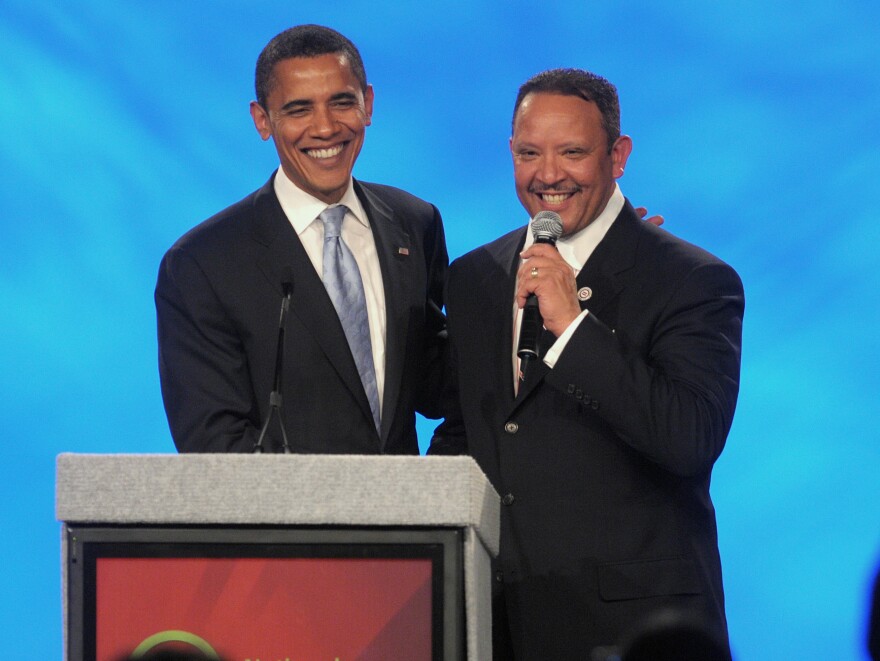President Obama's speech to the National Urban League conference in New Orleans on Wednesday night coincides with a debate over the role of government in helping small businesses succeed.
Some black Americans say they have an especially hard time when it comes to owning and operating their own businesses.
On the northern edge of New Orleans' French Quarter, Shaka Zulu and his wife, Na'imah, are trying desperately to protect a slice of local culture that sometimes gets lost here.
Following a Mardi Gras Indian tradition, each year African-Americans chant, parade through the city, and wear outfits elaborately decorated with beads and feathers. Zulu says it's all to pay homage to Native Americans who helped blacks during the time of slavery.
Last year, he and his wife opened a restaurant and gallery called Golden Feather, where several Mardi Gras suits are on display.
"It's almost like an experience, you know, not so much a restaurant but you want to come in here and have an experience on a culture that's so unique to New Orleans."
It seems a perfect fit for this touristy city. But for the Zulus it's been a struggle every step of the way. Na'imah Zulu says they had to launch the business using their own savings and the help of a couple of nonprofits because they couldn't get any bank loans.
"Of course, you know, business loans have a lot to do with whether you have homes and your assets and things like that," she says. "Well, a lot of us don't have [an] extreme amount of assets due to our history."
Three C's: Contracts, Contacts, Capital
Indeed, that's a problem for lots of African-Americans, whom studies show haven't accumulated nearly the same amount of wealth as whites. It's a little of a chicken-and-egg thing, says National Urban League President Marc Morial, a former New Orleans mayor.
Morial notes that the number of black-owned businesses has grown dramatically over the past decade, but the overwhelming majority have no employees and have revenues below $50,000 a year.
"Black-owned businesses still face the challenges of the three C's," says Morial. "Contracts, which mean opportunities to do business. Contacts, which lead to business opportunities. And capital."
Morial's group has started working more closely with lenders and major banks to help make some of those relationships happen. Morial says the Obama administration has done a lot to help, especially through the Small Business Administration, but he's pushing the White House to be even more aggressive.
"We still have record high unemployment. We have record high unemployment in the African-American community, and there's a lot more work to be done," Morial says.
Vaughn Randolph Fauria, president and CEO of NewCorp Inc., a nonprofit that assists such companies in New Orleans, agrees. But she's also worried about pressure to cut government programs that help minority-owned businesses.
"Things are getting better," says Fauria. "But if we take out right now what is the safety net, then it could crumble. And so all of this work would then be something of the past, as opposed to something that built our future."
Help For Minority Contractors
Fauria says black-owned businesses not only get a lot of help from the SBA and other agencies, they also benefit greatly from requirements that minorities get at least a share of government contracts.
One of her clients, though, Louis Livers, says it's not always a sure thing that the money will trickle down to local businesses. He's had a general contracting company in New Orleans since 1990, and notes that billions of dollars were spent reconstructing the city after 2005's Hurricane Katrina.
"If half of the money had stayed here, this place would not look the way it does, that you drive around certain sections of New Orleans and it still looks like Katrina was days ago," says Livers.
Instead, he says, most of the money went to large out-of-state contractors.
Now, he and others have formed the Alliance of Minority Contractors so their companies can get a bigger piece of the pie, and hopefully hire local workers.
Shaka Zulu says that's the hardest thing for him at his restaurant. People come in looking for work, and he needs help to grow his business. But he doesn't have the money to hire them.
Copyright 2021 NPR. To see more, visit https://www.npr.org. 9(MDA4MDc0NDkyMDEzMTQ4ODU0MTE0OGNiNg004))



